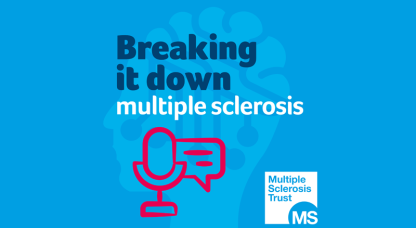Jennie Harrod writes about her journey with MS and how swimming has helped her, both mentally and physically.
How swimming has helped with my MS
26 March 2019

It does not matter how slowly you go as long as you do not stop.
Confucius
My diagnosis in 2003 aged 42, left me with limited manual dexterity and extreme fatigue. Fortunately, the leg paralysis and other sensory disturbances were reversed by IV steroids. However, MS did rob me of my nursing career and, in 2008, with an uncertain future, we moved to a bungalow on the Isle of Wight.
It wasn't until 2012 that I thought I should try to get some physical exercise. Walking was becoming more difficult as my symptoms worsened. I had always enjoyed swimming and began to wonder if this might be an option.
I eventually rang the local Leisure Centre about the Swimming Club for people with disabilities, which It transpired was not actually organised by the Centre but an outside club. So, on the Saturday, there I was with my nerves and a new size 24 extra-long swimsuit (I am over six-foot tall!). The session was totally informal just do your own thing - swim, float or just move in the water. That first week I swam 20 (slow) lengths and was really pleased with myself - the group was friendly and I thought this was something I could do regularly - not least because cranio-facial hyperhidrosis means I get red faced, and sweating scalp even just sitting still - you don't notice sweat in the pool!
I built up my kit to include a nose-clip, goggles and a waterproof MP3-player (yes, they do exist!) and started attending some afternoon casual sessions, by now regularly swimming 64 lengths (a mile) and managing to get my time down from 60 minutes to just 47.
Benefits of exercise
All exercise releases endorphins (feel good hormones) with evidence to show swimming in particular can reduce stress, and benefit social, physical, and mental health. Just being in the pool makes it easier to move, with the water reducing the weight on joints by up to 90%, and even gentle swimming providing a full body workout.
Physical health
A recent episode of breathlessness led me to my GP - after some lung-function tests he said he could tell I was a swimmer as my results were 25% better than most women of my age and height!
Unfortunately, my MS is now secondary progressive with demyelination causing muscle weakness meaning I cannot co-ordinate legs and arms. Instead of kicking, my legs flail along behind like some sort of clockwork turtle. In an effort to strengthen my legs, I am including more breast-stroke where, they at least make an attempt at a frog kick, and lengths using a float to propel myself - using only my legs. Sadly though, I've had to reduce swims to 40 lengths, as, although I could swim further, I wouldn't have enough energy to shower and dress - MS fatigue strikes again!
That first week I swam 20 (slow) lengths and was really pleased with myself - the group was friendly and I thought this was something I could do regularly.
Mental health
As one of the estimated 50% people with MS to suffer depression, I have been taking antidepressants for many years, however, recent evidence shows aerobic exercise helps mild to moderate depression, and I certainly find my mood lifts after a swim.
As a solo swimmer (by choice), once my goggles, MP3 player and nose-clip are on, its just me, the water and my music, then by focusing on my breathing and strokes I escape all my other stressors - this is my own ‘mindfulness'. Hopefully eventually I will be able to come off the medication but, if not, at least I know my swimming is also helping.
Social health
You can swim alone, with a friend, or as part of a group. I considered 'aquacise' sessions, but they are always at unsuitable times for me due to my fatigue. I chose the swimming club for disabilities where I made some new friends and we even have a Facebook page called ‘Different Strokes' - if you saw us all you would know why!
Motivation and obstacles
It's always difficult to introduce lifestyle changes, my motivation comes from going regularly plus feeling (and seeing) the benefits, having some music breaks the monotony of length swimming, plus I am now in size 18 swimsuits!
Most pools have disabled changing facilities and a hoist to get wheelchair users into the water. Find your local pool and see what they offer.
Of course, there are other activities you might consider - As IoW Lead Support Volunteer I persuaded our MSS Group to fund both free weekly swimming, and monthly ten-pin bowling for people with MS. Bowling can even be played from a wheelchair. Maybe your local MSS-Group offers something like this, or if not perhaps you could suggest it.
If you really are too apprehensive to try and go it alone (and can't find a buddy to go with), why not try some of the MS Trust staying active with MS exercises, or the MS Society move more for MS online videos. You can do these at your own pace.
Find out more
- Choosing the right exercise - information from the MS Trust
- Starting to exercise - information from the MS Trust
- Staying active with MS - information from the MS Trust
Latest news & stories
Sign up to updates from us
Keep up-to-date with the latest MS news, explore new research, read the stories of people living with MS, find out practical tips from MS experts, and discover exciting fundraising opportunities
If you would like to sign up for post or telephone (SMS) updates you can complete our sign up form here


